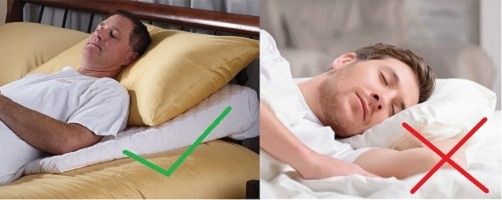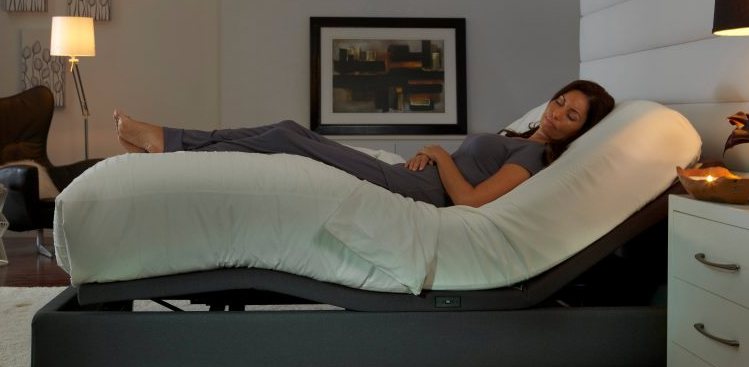If you think you are one of the few people, dealing with snoring, then you are very mistaken. Although nearly everyone snores occasionally, the number of people who have chronic snoring is most likely more than you could imagine.
Alone in the U.S.A millions of people suffer from snoring. It is estimated that snoring affects almost 60% of men and 40% of women in the country (1),(2).
Snoring is a quite common problem and affects not only snorers but also those around them. As such many snorers seek and try different methods to get rid of their snoring.
One of these methods claimed to reduce snoring is elevating the head during sleep. Just even checking the questions people asked to search engines, we can easily infer that many want to know whether elevating the head is an effective way to stop snoring. Here are a couple of related questions people asked to search engines:
- Does sleeping upright help stop snoring?
- Can elevating head stop snoring?
- Does pillow height affect snoring?
- Could propping up stop snoring?
Well, in this article we will investigate this method thoroughly. However, if you look for a prompt answer to the question “Does Sleeping Elevated Help You Stop Snoring?”: Yes, sleeping elevated can help you stop snoring”.
This method worked for many people and may work for you as well. But, the fact that many people improved their snoring by raising their heads during sleep is not enough to draw a conclusion.
Therefore, we need to refer to related studies and also listen to what experts have to say about the effectiveness of this method.
But, before that, we need to know how snoring works. In this way, we can better understand how elevating the head while sleeping can help you stop snoring.
What Causes Snoring?
Snoring occurs when air can’t move effectively through your nose and throat while you sleep. When airflow is partially blocked by the narrowed airway, forced airflow causes the surrounding tissues to vibrate, producing the sound we call snoring (3),(4).
The question to ask is what narrows your airway, thus causing snoring? In fact, there can be many factors that narrow the airway during sleep.
For instance, muscles in the back of the roof of your mouth, tongue or throat can narrow your airway if they relax too much while sleeping (5).
It begs some questions such as: Why do the muscles in your upper airways relax too much and block airflow? or, Why your tongue position prevents proper breathing?
The thing is that upper airway muscles always relax during sleep. But, when they relax too much, they narrow the airway, causing snoring.
The following factors can explain why your airway becomes narrow during sleep, causing snoring.
- Anatomy of your mouth
- Nasal Problems
- Alcohol consumption
- Weight gain
- Allergies
- Sleep position
- Sleep deprivation
How Does Sleeping Elevated Help you Stop Snoring?
From the previous section, we have understood that when the airflow is blocked due to the narrowed airway, forced airflow causes the surrounding tissues to vibrate, producing a snoring sound.
So, how raising the head while sleeping help prevents snoring? Does this sleeping position keep the airways open thus preventing snoring?
Here is how raising your head during sleep can help you overcome snoring.
1- Sleeping Elevated Reduces Pressure
As mentioned above, snoring occurs when breathing is partially or totally blocked due to certain reasons such as having extra tissue in the back of the throat (3).
When you sleep as your head is elevated, pressure is reduced from your airway. And, that in turn, improves your breathing.
According to Cleveland Clinic (6); the most ideal sleeping positions in terms of breathing is both:
- Sleep on your side with a pillow between your legs and your head elevated with pillows.
- Sleeping on your back with your head elevated and your knees bent, with a pillow under your knees
In both positions, as you see an elevated head is indicated as the most suitable position for breathing. Needless to say, the better your breathing is during sleep the less risk of snoring you carry.
However, it is important to note that lifting solely your head with a bunch of pillows can make your snoring worse (7). To prevent this from happening, try to lift your whole upper body along with your head, as is seen in the image below.

Image Credit: antisnorehub.com
Another important thing to point out is that if you keep snoring while sleeping on your back despite your head being elevated, then consider sleeping on your side with your head elevated. Then, see whether sleeping elevated on your side is more effective for stopping snoring.
The small handicap of this method though, many people may not find this sleeping position comfortable. But, if this method restrains your snoring, then it should be worth trying. After all, sleeping without snoring can significantly increase the quality of your sleep and life.
If you are asking about the degree of head elevation, consider raising your head at least 20 to 30 degrees.
2- Sleeping Elevated Relieves Sinusitis
Another underlying cause of snoring is sinusitis. Sinusitis cause swelling in the nose, thus blocking breathing through the nose. When it happens, the mouth remains the only organ to breathe through (8).
Bear in mind that if you breathe through your mouth when you are asleep, you are more likely to snore, according to sinus specialists (9),(10).
There can be many factors that lead to mouth breathing during sleep. And sinusitis is indeed one of them that can force you to breathe through your mouth.
That indicates, that if you could relieve your sinuses at night, you also could lower the risk of snoring while sleeping. According to Harvard Health Publishing; there are many ways to reduce your chance of developing sinusitis and propping the head up during sleep is one of them (11).
Dr Satish Govindaraj, an associate professor of otolaryngology and neurosurgery at Mount Sinai Hospital in New York City suggests that; sleeping with your head elevated on a few pillows decreases blood flow pooling in the nose and can prevent the nasal passages from getting clogged (12).
So, consider raising your head when you deal with a stuffy nose. It can help prevent nasal congestion and allow you to breathe through your nose. It bears repeating if you breathe through your nose while sleeping, you have a lesser risk of snoring.
3- A Study
In a 2017 study, researchers aimed to evaluate the effect of a mild degree of head elevation on obstructive sleep apnea (13). Fifty-two Brazilian men and women with obstructive sleep apnea – which is a sleep disorder – took part in the study.
Note: Obstructive sleep apnea is the most common type of sleep apnea. It is very related to our topic because snoring is one of the symptoms of sleep apnea. If you have this sleep disorder your breathing during sleep repeatedly stops and starts and that, in turn, can increase the risk of snoring (3),(14).
The study found that a mild degree of head elevation significantly reduced the severity of obstructive sleep apnea among the participants. Thereupon, researchers suggested that head elevation is a simple alternative treatment to ameliorate obstructive sleep apnea (13).
This study proves that a mild head elevation can improve breathing while sleeping. As mentioned earlier, the better you breathe during sleep the less risk you carry for snoring.
Ways to Elevate Your Head During Sleep
Thus far, we have talked about the potential impact of head elevation on snoring. Our findings showed that head lifting might be an effective way to stop snoring. Yet, we haven’t indicated the ways to elevate the head while sleeping.
Everyone can think of putting a couple of pillows under their heads for head elevation. Although it is indeed a way to raise the head, there are also other ways to lift the head during sleeping. Here are some of them…
1- Adjustable Bed

An adjustable bed allows you to lift your upper body electronically. With such a bed, you can also raise your lower body by simply pressing the relevant button. Adjustable beds are arguably the best and most comfortable ways to elevate both your upper and lower body. But, its relatively high price may cause you to opt for other head elevation methods.
2- Wedge Pillows
A wedge pillow, typically made of polyfoam or memory foam, is used to elevate the upper body while sleeping or lying. In general, many people who suffer from acid reflux, snoring and sinusitis use this type of pillow to improve their condition. The degree of a wedge pillow can vary based on why it is used (15).
In our case (snoring), consider raising your head at least 20 to 30 degrees with a wedge pillow.
3- Bed Risers
As the name suggests, bed risers are used to elevate the bed. Place bed risers under the two bedposts at the head of the bed so that the head of the bed remains relatively elevated. Choose bed risers at least 8 inches high (16),(17).
Summary
Since the causes of snoring vary from person to person, it is not right to say that elevating the head while sleeping will certainly reduce your snoring. It may or may not be based on what causes your snoring.
That being said, many people find this technique quite useful. Moreover, sleep experts and studies also support the effectiveness of propping the head during sleep in terms of snoring.
Sleeping your head elevated may not be comfortable for you. But, it is worth trying if you are to stop snoring.
Snoring can affect one’s quality of life and those around him/her. So, try also other methods that can help stop snoring such as quitting smoking, losing weight, and avoiding drinking alcohol close to bedtime.
Plus, sleeping on your back and slightly elevating your head can also help you avoid sleep wrinkles.
Tarkan is an experienced health writer ( currently more than 600 articles ) and also the founder of this website namely www.neededforhealth.com. His expertise in health stems from in-depth medical research and knowledge which he obtained over the course of many years.
Tarkan enjoys sharing factual knowledge on health, psychology and nutrition. He always aims to deliver evidence-based recommendations, provide links to related scientific studies.

